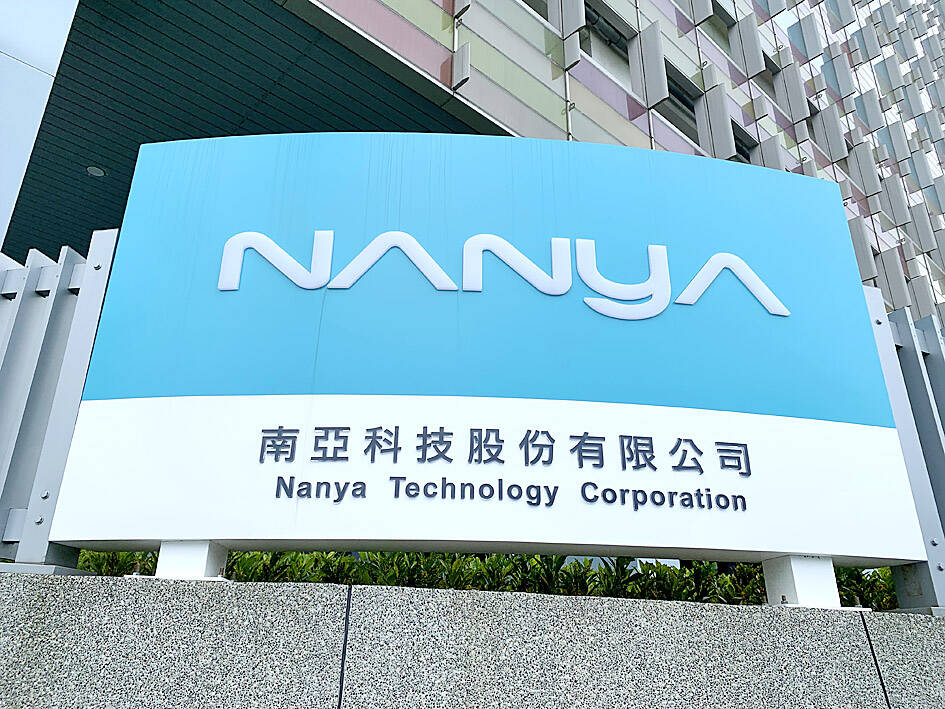Chipmaker Nanya Technology Corp (南亞科技) yesterday said it is aiming to swing back into profit in the second half of this year, from losses of NT$7.45 billion (US$239.24 million) last year, as improving demand for DRAM chips used in artificial intelligence (AI) devices helps reduce supply chain inventory.
As the world’s major memorychip makers are concentrating on shifting capacity to next-generation DDR5 and high-band-memory chips mostly used in AI devices and servers, the supply of mainstream DDR4 chips is slowing, Nanya Technology said.
The shift is also leading to faster inventory digestion throughout the supply chain and triggered a price rebound for memory chips last quarter, it said.

Photo: Grace Hung, Taipei Times
Average selling prices rose by a low single-digit percentage sequentially last quarter, the first uptick in about two years, Nanya Technology president Lee Pei-ing (李培瑛) said.
The uptrend is likely to continue for the rest of this year, Lee said.
“AI PCs and AI smartphones are boosting demand for DRAM chips,” Lee said. “Demand for smartphones in China is also picking up after a trough.”
DRAM chips are to bounce back at a faster rate this quarter than last quarter, he said.
To align with improving demand, Nanya Technology said it is moderating its production. The New Taipei City-based company cut its factory utilization by about 20 percent over the past few quarters to cope with sluggish demand.
The company plans to produce its first DDR5 chips in the third quarter of this year, targeting PC and server applications. The company currently primarily supplies DDR4 and DDR3 chips.
Overall shipments are projected to grow 20 percent year-on-year, reversing a mid-single-digit percentage fall last year, the company said.
Nanya Technology said it plans to budget capital expenditure of NT$20 billion this year, compared with NT$13.1 billion last year.
The company yesterday reported a quarterly loss of NT$2.49 billion last quarter, compared with a loss of NT$2.51 billion the previous quarter.
Gross margin improved to minus-13.6 percent last quarter, from minus-25.2 percent the prior quarter, on the back of better chip prices and lower losses from idled capacity.

CAUTIOUS RECOVERY: While the manufacturing sector returned to growth amid the US-China trade truce, firms remain wary as uncertainty clouds the outlook, the CIER said The local manufacturing sector returned to expansion last month, as the official purchasing managers’ index (PMI) rose 2.1 points to 51.0, driven by a temporary easing in US-China trade tensions, the Chung-Hua Institution for Economic Research (CIER, 中華經濟研究院) said yesterday. The PMI gauges the health of the manufacturing industry, with readings above 50 indicating expansion and those below 50 signaling contraction. “Firms are not as pessimistic as they were in April, but they remain far from optimistic,” CIER president Lien Hsien-ming (連賢明) said at a news conference. The full impact of US tariff decisions is unlikely to become clear until later this month

Popular vape brands such as Geek Bar might get more expensive in the US — if you can find them at all. Shipments of vapes from China to the US ground to a near halt last month from a year ago, official data showed, hit by US President Donald Trump’s tariffs and a crackdown on unauthorized e-cigarettes in the world’s biggest market for smoking alternatives. That includes Geek Bar, a brand of flavored vapes that is not authorized to sell in the US, but which had been widely available due to porous import controls. One retailer, who asked not to be named, because

CHIP DUTIES: TSMC said it voiced its concerns to Washington about tariffs, telling the US commerce department that it wants ‘fair treatment’ to protect its competitiveness Taiwan Semiconductor Manufacturing Co (TSMC, 台積電) yesterday reiterated robust business prospects for this year as strong artificial intelligence (AI) chip demand from Nvidia Corp and other customers would absorb the impacts of US tariffs. “The impact of tariffs would be indirect, as the custom tax is the importers’ responsibility, not the exporters,” TSMC chairman and chief executive officer C.C. Wei (魏哲家) said at the chipmaker’s annual shareholders’ meeting in Hsinchu City. TSMC’s business could be affected if people become reluctant to buy electronics due to inflated prices, Wei said. In addition, the chipmaker has voiced its concern to the US Department of Commerce

STILL LOADED: Last year’s richest person, Quanta Computer Inc chairman Barry Lam, dropped to second place despite an 8 percent increase in his wealth to US$12.6 billion Staff writer, with CNA Daniel Tsai (蔡明忠) and Richard Tsai (蔡明興), the brothers who run Fubon Group (富邦集團), topped the Forbes list of Taiwan’s 50 richest people this year, released on Wednesday in New York. The magazine said that a stronger New Taiwan dollar pushed the combined wealth of Taiwan’s 50 richest people up 13 percent, from US$174 billion to US$197 billion, with 36 of the people on the list seeing their wealth increase. That came as Taiwan’s economy grew 4.6 percent last year, its fastest pace in three years, driven by the strong performance of the semiconductor industry, the magazine said. The Tsai